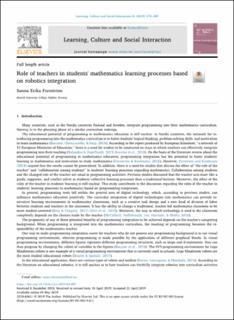Role of teachers in students' mathematics learning processes based on robotics integration
Peer reviewed, Journal article
Published version
Permanent lenke
https://hdl.handle.net/11250/2641987Utgivelsesdato
2019-05-04Metadata
Vis full innførselSamlinger
Originalversjon
Learning, Culture and Social Interaction. 2019, 21, 378-389. 10.1016/j.lcsi.2019.04.005Sammendrag
We analyze the role of the teacher in the collective learning processes of students using Engeström's (1987) activity system analysis in cultural–historical activity theory (CHAT). CHAT enables the analysis of the effect of various components, such as the role of the teacher in collective learning processes. CHAT considers teaching to be one part of students' learning processes and enables researchers to analyze learning and the teacher's role in collective learning processes where the teacher is a participant (Engeström & Sannino, 2012). In this model, knowledge is distributed among participants and tools. Learning is thus viewed and analyzed as a development of the collective knowledge of a group rather than as knowledge transferred from the teacher to the students (Engeström, 2005). In the sessions analyzed as part of this research, teaching and learning were affected through innovative, collective group processes, as well as through interactions between students and the teacher. Our analysis concentrates on student–teacher relationships as measured through interactions and negotiations between the teacher and the students during the open learning processes with robots.

